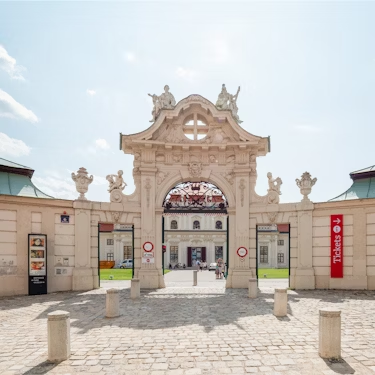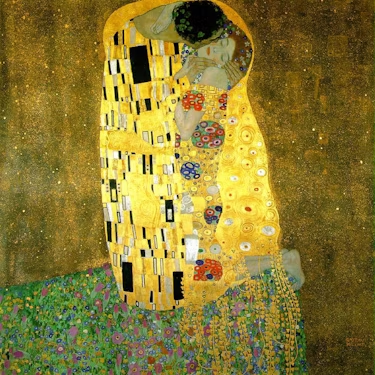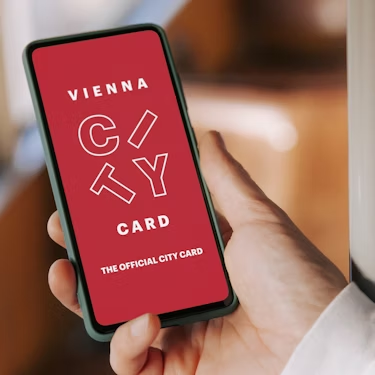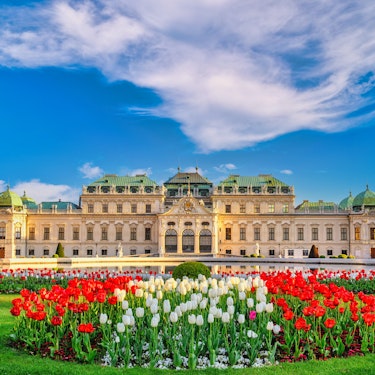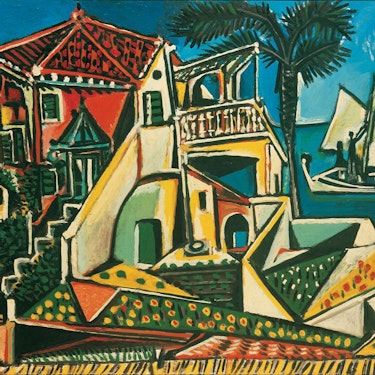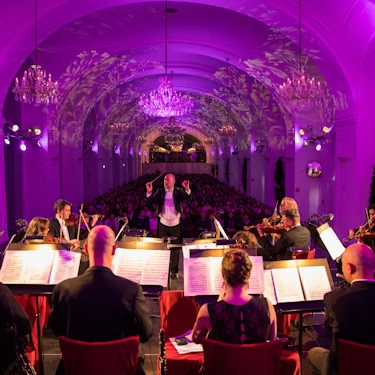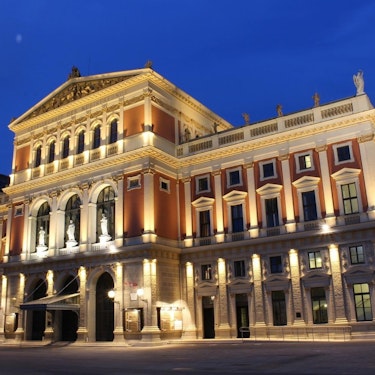More about: Belvedere Palace in Vienna Tickets and Tours
The Belvedere Palace houses one of the most visited museums in the country. The building, divided between the Upper and Lower Belvedere, was built in the eighteenth century to be the summer residence of Prince Eugene of Savoy. Today you will find inside a fantastic collection of art that you should not miss. Here I tell you everything you need to know to get your tickets.

Vienna Upper Belvedere and Gustav Klimt Permanent Collection Tickets
Skip-the-line tickets to enjoy the best works of art in the museum
Perfect if you want to enjoy some essential works of world art history without having to wait in line to get in. Spend some time also strolling through the gardens.
Often, the enormous attractions of the streets of Vienna makes you lose sight of what its museums house. A good example is the Belvedere Palace, a fabulous building built in the 18th century that today houses works by such renowned artists as Gustav Kilmt and Egon Schiele.
Con Vienna Upper Belvedere and Gustav Klimt Permanent Collection Tickets you will be able to visit the rooms located in the Upper Belvedere, including the most famous of the entire collection: the Kiss of Klimt. In addition, you can also tour the beautiful gardens surrounding the building. All this without having to wait in the long queues that usually form to enter the museum.
Recommended if... you want to enjoy some of the best works of art in the whole country in a fantastic setting and without having to queue.
How to get tickets for the Belvedere Palace at the box office
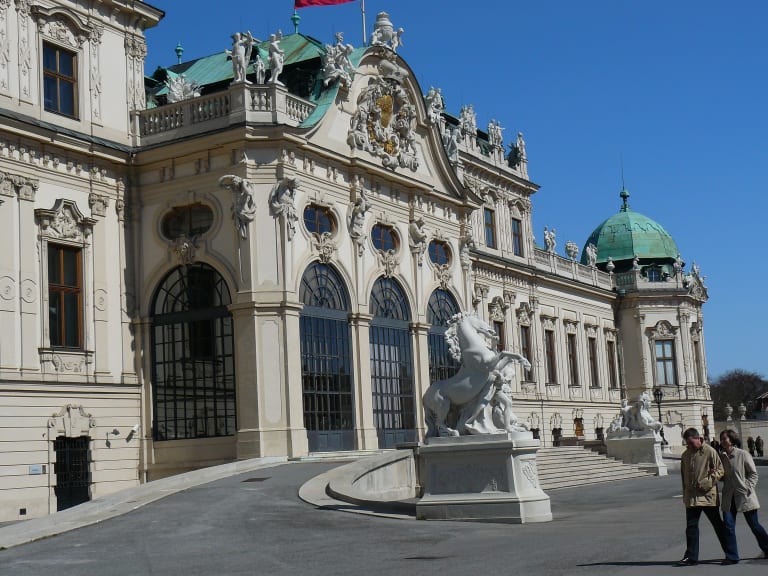
In case you have not purchased the Vienna Upper Belvedere and Gustav Klimt Permanent Collection Tickets or do not have the Vienna Pass, with the advantages that this entails, you can buy them at the ticket office of the palace itself. To do this you have to use the access to the gardens located in Rennweg and approach the Lower Belvedere building.
Once you pass the gate that communicates with the front courtyard of the palace, you must go around the green area in front of the building and turn right. This is where the door leading to the visitor center is located. In this area you will find the ticket offices (where you will almost certainly have to queue), toilets and lockers where you must leave your backpacks if you are carrying them, as it is forbidden to bring them inside.
Tickets to the Belvedere Palace can be purchased in various formats depending on the areas you want to visit. The areas that can be visited are as follows:
- Only Upper Belvedere: where are the paintings of Klimt and other painters.
- Only Lower Belvedere: includes several rooms with sculptures, the orangerie (the old greenhouse), the stables and the private garden.
- Solo Belvedere 21: contains works from the post-war period.
- Belvedere ticket: combines the visit to the Upper and Lower Belvedere.
- Full ticket: to visit all areas of the palace complex.
Since a few years ago, the museum has established the same entry system that prevails in Schoenbrunn Palace. Thus, when buying the ticket (regardless of the way) you must choose a time slot in which to enter. Once inside, however, the time is not limited in any way.
Since buying tickets at the ticket office does not allow you to skip the queues, the museum itself advises you to try not to book the time slot from 11:00 to 14:00 hours, as this is when it receives more visitors.
How much do tickets to the Belvedere Palace cost?

The price of tickets purchased at the ticket office or on the website of the monument varies depending on what you want to visit:
- Upper Belvedere: although prices may change, the general admission ticket will cost you about 15,90 € if you buy it online (18 € at the box office). Seniors over 65 and students under 26 will only have to pay about € 13.40 (€ 15.50 at the box office). Admission is free for children up to the age of 19. Vienna Card holders also get a discount.
- Lower Belvedere: the normal ticket costs online about 13.90 € (16 € at the box office), while seniors over 65 and students up to the age of 26 will have to pay about 11 € (12.50 € at the box office). The conditions for children under 19 are the same as in the previous case.
- Belvedere 21: if you only want to visit Belvedere 21 you will have to pay € 8.90 (€ 10.50 at the ticket office). Seniors over 65 and students up to 26 years pay € 6.90 (€ 8 at the box office), while children under 19 are free.
- Belvedere ticket: to enter the Upper and Lower Belvedere you have to buy a ticket that costs about 22,90 € (26 € at the box office) or 19,90 € (23,50 at the box office) if you are over 65 or a student up to 26 years old. Children under 19 years old do not have to pay anything.
- Full ticket: about 24,90 € (29 € at the box office). Seniors over 65 and students under 26 can access for about 21.90 € (25 € at the box office). As with the rest of the tickets, children under 19 are exempt from paying.
On the other hand, the entrance only to the Belvedere Palace gardens is completely free, without having to pay anything.
Belvedere Palace opening hours

The gardens can be visited from 6:30 a.m. to 9:00 p.m. in the evening. As for the buildings, the opening hours are as follows:
- Upper Belvedere: from Monday to Sunday between 10:00 am and 6:00 pm, although in August the closing hours are usually extended to 7:00 pm and on Fridays it does not close until 9:00 pm.
- Lower Belvedere: from 11:00 to 18:00 hours from Tuesday to Sunday, but on Thursdays it does not close until 21:00 hours. The museum is open on some holidays on Mondays.
- Belvedere 21: every day of the week between 10:00 am and 6:00 pm.
Is there an audio guide and how much does it cost?

If you want to make the visit receiving information about everything you are seeing, the Belvedere Palace offers audio guides for all visitors.
In the Upper Belvedere is located at the entrance and you can select it in several languages, including Spanish.
On the other hand, if you want it for the Lower Belvedere you must pick it up at the ticket counter, but they are only available in German or English.
As for the price to have an audio guide, it ranges from 5 € for the Upper Belvedere to 4 € for the Lower Belvedere.
How much time you need to visit the Belvedere Palace
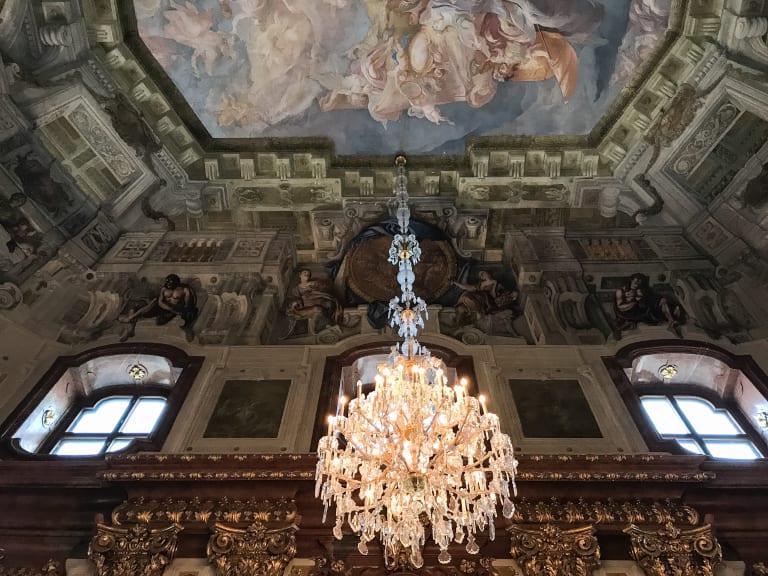
Although it depends a lot on the parts you wanted to visit and, of course, on your interests, the visit to the Belvedere Palace usually takes between 2 and 3 hours. My advice is to focus on the pictorial collections of the Upper Belvedere and the gardens, since in Vienna you will find palaces with a more interesting baroque interior architecture than the Lower Belvedere.
What not to miss at the Belvedere Palace
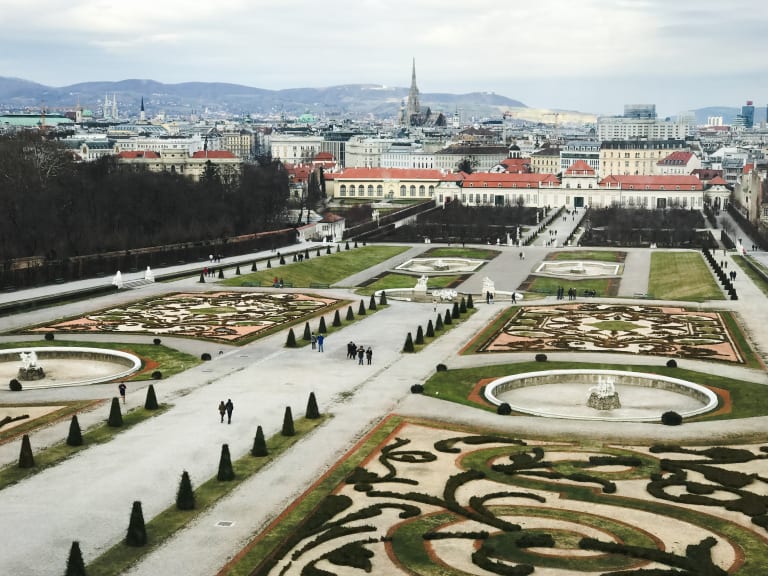
The Belvedere Palace is one of the essential visits you must make if you travel to the capital of Austria. Not only for its baroque architecture, but also for housing one of the most interesting collections of paintings in the country.
This palace was built in the fifteenth century by order of Prince Eugene of Savoy. Its first function was to serve as a summer residence and a space for celebrations by this nobleman. When the prince died, the building passed into the hands of Empress Maria Theresa.
Today it houses a number of Austrian art collections ranging from medieval times to the present. The complex has two different palaces, the Upper Belvedere and Lower Belvedere, linked by a huge French-style garden.
- Upper Belvedere: this palace is the main building of the complex, something that can be verified just by looking at its elaborate facade. Beyond its architecture, the palace is one of the most visited monuments in the country for housing the so-called Austrian Gallery, a collection of paintings by painters of the nineteenth and twentieth centuries. Among all that is exhibited are some paintings by Gustav Klimt, especially "The Kiss" and "Judith". In addition, it is also worth visiting the Terrena hall (where some interesting classical music concerts take place), the chapel and the Marble Hall.
- Lower Belvedere: smaller than the previous one and with a much simpler facade, the most interesting places in this building are the Hall of the Grotesques, the Hall of Mirrors and the Marble Gallery. In all these rooms you can see sculptural works by some of the artists of the so-called Golden Age of Vienna, which took place between 1683 and 1780. The entrance to the Lower Belvedere usually includes a visit to the Orangerie, which was used as a greenhouse by the imperial family and today hosts some temporary exhibitions.
- Gardens: strolling through the French-style gardens is another attraction of the palace. Not in vain, they were designed by one of the favorite students of the creator of the Gardens of Versailles. This green space is divided into three levels. Possibly, one of the favorite areas, especially if you have gone to Vienna with children, will be its two waterfalls adorned with statues of nymphs and cherubs.
- Belvedere 21: in this building, located outside the complex, you can see an interesting collection of contemporary Austrian art. Depending on your taste, Belvedere 21 itself may also catch your eye, as its architecture is truly impressive.
How to get to Belvedere Palace
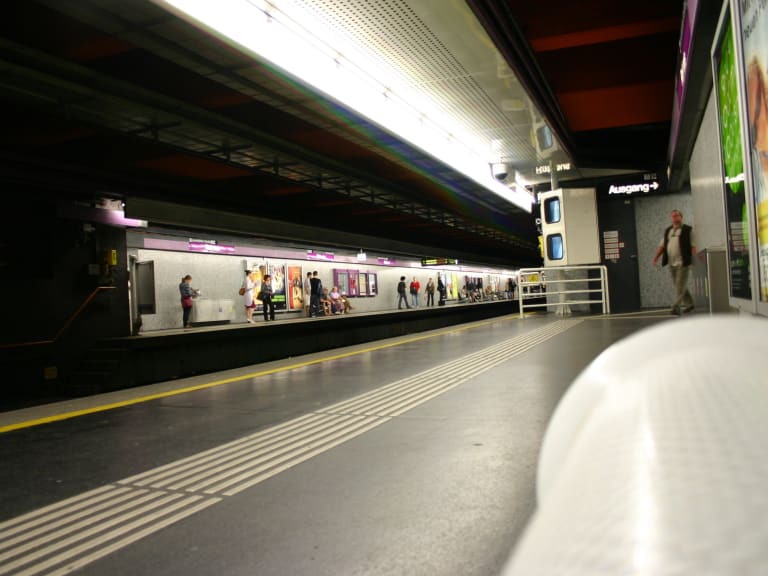
Getting to the Belvedere Palace from the center of Vienna is not difficult. For example, the Stephansplatz (where St. Stephen's Cathedral is located) is only one kilometer away, so you can walk there without any problems.
For those less fond of walking (or if the weather is bad), the Austrian capital offers several means of transport that you can use to reach the palace easily:
- Subway - U-Bahn: near the Belvedere Palace you are going to find two stops that will suit you well, the Stadtpark and Karlsplatz. It is only about 500 meters from the entrance to the monument. Another option is to get to the Hauptbahnhof station and access the palace through the entrance to the upper gardens. Here is a map of the lines of this means of transport.
- Streetcar: possibly the best option to reach the Belvedere Palace. Both lines D and 71 have stops near the entrances to the monument and can be taken in front of the Opera House or near Maria-Theresien-Platz and the Town Hall.
- Sightseeing buses: some of Vienna's sightseeing buses have a stop right at Prinz Eugen-Straße, a perfect place to enter the palace.

